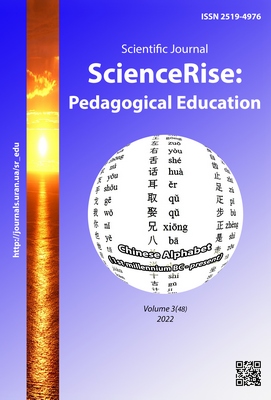Possibilities of effective formation of natural concepts in children of senior preschool age
DOI:
https://doi.org/10.15587/2519-4984.2022.257500Keywords:
natural concepts, ideas, preschool education, children of senior preschool age, ecological competence, ecological educationAbstract
The possibility of forming natural concepts in older preschool children is proved. Analyzed and selected in accordance with the purpose of the study, the definition of the term "concept" indicates that natural concepts are part of ecological competence of the child. Unlike representations, which reflect the object in a set of many different features, both significant and insignificant, the concepts carry a general, social experience, denote the essence of the object and distinguish it from all other objects. An important task of the teacher is to stimulate students' desire to acquire knowledge independently, to transform children in active participants in the educational process, to understand the essential features and connections of phenomena and objects of nature, which means to form concepts about them.
In the process of forming a natural concept, it is impossible to do without thinking operations, which include comparison, analysis, synthesis, abstraction and generalization. At about 5 years of age, there are significant changes in the child's thinking, but purposeful pedagogical influence will significantly increase the effectiveness of this.
In the course of the research methods, forms and techniques for the formation of natural concepts in students were selected. Verification of data formation initially took place at the ascertaining stage of the experiment and after the forming stage. Compared to the initial study, after organized work, the number of children with a high level of formation of natural concepts increased by 10 %, also the number of children with a medium level of formation increased by 7 %, and the number of low level decreased by 18 %. Thus, specially organized forms of work, selected methods and techniques help to form natural concepts in older preschool children
References
- Cassin, B., Apter, E., Lezra, J., Wood, M. (Eds.) (2014). Dictionary of Untranslatables: A Philosophical Lexicon. Vel. 1. Princeton: Princeton University Press, 1344. doi: http://doi.org/10.1515/9781400849918
- Merriam-Webster`s Dictionary. Available at: https://www.merriam-webster.com/dictionary/concept
- Merriam-Webster`s Collegiate Thesaurus (2019). Springfield: Merriam-Webster, Inc., 1184.
- Plokhіi, Z. (2008). Suchasnii zmіst ekologіchnogo vikhovannia. Doshkіlne vikhovannia, 3, 3–6.
- Kot, N. (2012). Do pytannia pro tekhnolohii ekolohichnoho vykhovannia doshkilnykiv: zahalnyi pidkhid. Visnyk Instytutu rozvytku dytyny. Seriia: filosofiia, pedahohika, psykholohiia, 23, 96–100. Available at: https://ird.npu.edu.ua/files/kot.pdf
- Lysenko, N. V. (2015). Eko-oko: doshkilnyk piznaie svit pryrody. Kyiv: VD «Slovo», 352. Available at: https://pidru4niki.com/85379/ekologiya/eko-oko_doshkilnik_piznaye_svit_prirodi
- Prokhorova, L. N., Krivova, L. I., Klimova, N. R., Menshchikova, L. N. (2008). Organizatciia eksperimentalnoi deiatelnosti doshkolnikov. Moscow: ARKTI, 64.
- Babaeva, T. I., Klarina, L. A., Mikhailova, Z. A. (2012). Razvitie poznavatelno-issledovatelskikh umenii u starshikh doshkolnikov. Moscow: Detstvo-Press, 160.
- Shynkaruk, V. I. (Ed.) (2002). Filosofskyi entsyklopedychnyi slovnyk. Kyiv: Instytut filosofii imeni Hryhoriia Skovorody NAN Ukrainy: Abrys, 742. Available at: https://archive.org/details/filosofskyi_entsyklop/mode/2up?view=theater
- Dubichynskyi, V. V. (Ed.) (2006). Suchasnyi tlumachnyi slovnyk ukrainskoi movy. 65000 sliv. Kharkiv: VD «Shkola», 1008.
- Konverskyi, A. Ye. (2017). Lohika. Kyiv: VPTs «Kyivskyi universytet», 391. Available at: http://philosophy.univ.kiev.ua/uploads/editor/Files/LIBRARY/KONVERSKII/1.pdf
- Khomenko, I. V. (2007). Lohika. Kyiv: Tsentr uchbovoi literatury, 335. Available at: http://padaread.com/?book=89853
- Kovaliv, Yu. I. (2007). Literaturoznavcha entsyklopediia. Vol. 2. Kyiv: VTs «Akademiia», 624. Available at: https://archive.org/details/literaturoznavchat2/mode/2up?view=theater
- Stelmakh, S. P. (2005). Istoriia poniat. Entsyklopediia istorii Ukrainy. Vol. 3. Kyiv: Nauk. dumka, 672. doi: http://history.org.ua/LiberUA/ehu/3.pdf
- Kostiuk, H. S. (1989). Navchalno-vykhovnyi protses i psykhichnyi rozvytok osobystosti. Kyiv: Rad. shkola, 608.
- Bohush, A. M., Havrysh, N. V. (2008). Metodyka oznaiomlennia ditei z dovkilliam u doshkilnomu navchalnomu zakladi. Kyiv: Slovo, 404. doi: http://dspace.pdpu.edu.ua/jspui/bitstream/123456789/9123/3/Bogush%2CHavrysh%20%281%29.pdf
Downloads
Published
How to Cite
Issue
Section
License
Copyright (c) 2022 Olena Havrylo, Svitlana Kondratiuk, Olha Shapovalova, Yevdokiia Kharkova

This work is licensed under a Creative Commons Attribution 4.0 International License.
Our journal abides by the Creative Commons CC BY copyright rights and permissions for open access journals.
Authors, who are published in this journal, agree to the following conditions:
1. The authors reserve the right to authorship of the work and pass the first publication right of this work to the journal under the terms of a Creative Commons CC BY, which allows others to freely distribute the published research with the obligatory reference to the authors of the original work and the first publication of the work in this journal.
2. The authors have the right to conclude separate supplement agreements that relate to non-exclusive work distribution in the form in which it has been published by the journal (for example, to upload the work to the online storage of the journal or publish it as part of a monograph), provided that the reference to the first publication of the work in this journal is included.







